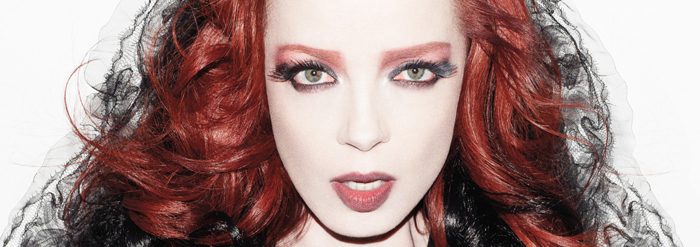
Shirley chats to Bullett
Garbage Frontwoman Shirley Manson Takes Another Shot at the Spotlight
Almost two decades and over 12 million albums after Garage barreled into the heart of alternative rock with their self-titled debut album, the fierty frontwoman returns to the spotlight armed with a new set of killer songs. From a firing range in Los Angeles, between hitting bull’s-eyes with a Walther p99, she takes aim at everything from tabloids to Twitter.
Shirley Manson has fired a handgun twice in her life. The first time was about three minutes ago, with her eyes closed. The second was just now, eyes open.
She peers down the firing lane at her target, a paper silhouette of a man with a single bullet hole at the center of his sternum. A kill shot. “I don’t know if I like this,” says the 45-year-old Edinburgh native, the Walther P99 still smoldering in her hand. “It’s a bit intense.” She hadn’t expected flames, for one. She lays the gun down in the booth, grabs a broom kept handy for sweeping up shell casings, and begins to tidy up the place. “In retrospect, maybe we should have gone with the little bullets,” she says, regretting her earlier decision to use the powerful 9mm over the peewee .22 round.
The reinforced door to the range opens, admitting a young, sane-looking, Australian couple with a Glock 19. They were told the Glock’s modest kick is gentle enough for children to fire (no more tears!), but they’ll be “working up to a .357,” they say by way of polite conversation before moving on, lightly titillated, to open fire from a neighboring booth. Dressed unassumingly—practically, even—in Chelsea ankle boots, a striped tunic under a black hoodie vest, oversize safety goggles, and 2-pound plastic earmuffs, Manson doesn’t exactly blend in at a shooting range in Burbank in the middle of a weekday afternoon. The few regulars hadn’t quite noticed her yet, but the Australians instantly recognize her. They might have shied away if not for Manson’s warm greeting. “They seem nice. Normal,” Manson says, just audible over escalating gunfire. “Right?”
Garbage, the multi-platinum rock band that Manson has fronted since 1994, recently finished recording their fifth album, Not Your Kind of People—their first since 2005’s Bleed Like Me. While touring for that release, they announced an abrupt and “indefinite hiatus,” a workhorse among indirect phrases. (Music business—exhausting, absurd. These things happen.)
The band’s inactivity didn’t mean rest for Manson. “I was making a solo album, but I was still signed to Geffen [Records],” where executives insisted she make a record that sounded “like Annie Lennox,” she says. “That’s when I knew I was fucked. It made me want to stop playing music, and I did.” At a cocktail party in Los Angeles, before she’d had much time to stew in her discontent, television producer Josh Friedman offered her an audition for a part on his new series, Terminator: The Sarah Connor Chronicles.
She took him up on it, earning a lead role as homicidal liquid-robot CEO Catherine Weaver. No one was more baffled than Manson. “I wasn’t good,” she says, refusing to concede anything further than, “I got better, maybe. But it was an amazing experience. I was like a kid on set.” Despite generally favorable reviews, the show was canceled after two seasons. (TV business—unpredictable, ruthless. These things happen.)
“When it finished, I didn’t know what to do,” Manson says. “I didn’t even know where to start. Then I realized: I want to make music with my band, that’s what I want.” Out this spring, the band’s new album calls to mind their earlier records primarily because, 12 million record sales later, Garbage, a band with nothing left to prove, placed a saucer of Shut The Fuck Up outside their studio door and made the record they felt like making. “It’s rekindled our childlike wonder for making records,” she says. “All the other stuff, we just let go. We went back to the music that excited us in the beginning.”
The collection of tracks bursts with unmitigated, joyous homage: Siouxsie and the Banshees, the Clash, and Bowie—“lots of Bowie, actually. Cocteau Twins. The Pretenders. We’re not coming out say- ing, Hey, we’re the new shit. We know all the hot sounds. We don’t. We don’t go to clubs anymore, and we’re not sitting around listening to underground dubstep.”
Reflecting on the band’s newfound maturity, she adds, “I don’t know. Maybe that’s not cool, but I’m not a cool person I’m hot. I get passionate, excited. If I meet someone who’s ‘cool’ with me, I’ll fuck- ing laugh in their face. Are you kidding me right now? Fucking blow me.”
Manson was 29 when Garbage’s first album came out. “I felt old at that age, ironically enough,” she says. “I was already older than my peers, thinking, I look ancient, I feel ancient, everybody else is like 18, 19. It’s a position I’m accustomed to being in.” Leaving aside the fact that at that time you could still buy a mobile phone that required a handle and a separate antenna, when Garbage’s last album came out “The Facebook” was just another Harvard idea wedging its way through Yale. “I feel like the tiger in the jungle who’s allowed to keep doing business because the younger tigers allow her to operate, and I feel grateful. But I don’t want to pretend I’m young. I’m not going to play that game. I’m not going to freeze my face to sell a record. That’s a trap set for women.”
Madonna, she says, is the most obvious example: “The tabloids complain about her looking old, and people laugh at her for that. Then Madonna goes and fixes her face, and they laugh at her for that. Even thought they begrudgingly say she looks amazing, they’ll still laugh at her for trying to look young. Then she steps out, looking amazing, and the tabloids go and blow up a picture of her aging hand. Nobody’s doing that to George Clooney, blowing up pictures of his hands! I look at these magazines, and I want to say to them, What’s your point? That she’s aged? Does that surprise you? Or is your ‘point’ an attempt to undercut what she’s achieved? I think it is, even if it’s on a subconscious level. And you probably wouldn’t turn down those hands if they were grabbing you under the table, you fucking idiots.”
Two booths down, a very serious man slides a very serious Luger from a fleece-lined attaché. “The thing I’ve learned over the past seven years,” she says, paying no mind to the Luger- brandishing possible psycho a few steps away, “is how hard it is for anybody to succeed in this music industry.” The pace of life in the pop world, and the actual workload of a successful pop star, have always been almost inhumanly demanding, however cushy it might seem. Billie Holiday was cooking up a tuna can full of heroin just to get up in the morning back when half of American homes didn’t have a television. The modern A-list pop star is tweeting for her life.
“To me, what’s happening with Rihanna is really disturbing. Don’t get me wrong—I love Rihanna—but what’s happening to her is what happened to Britney [Spears]. Record companies are overworking these girls, just pushing them and pushing them. It’s like taking a winning racehorse and stabbing it in the neck over and over with steroids. The companies are preying on these young girls, who are valuing themselves according to how many followers they have on Facebook. There’s press about how Rihanna’s about to collapse from exhaustion, and yet she’s about to put out a new record. It’s madness.”
The first target, fully aerated, flutters along its electrical track to the booth, and Manson takes it down from the clips. We’ve been working the neck and left shoulder pretty hard. Her diagnosis: “Dead.”
It’s impossible not to notice that the guy with the Luger is lining up silencers and miscellaneous tactical items on a towel with schizophrenic precision, while his compatriot has affixed an infrared scope to his .357 Magnum, now ready for uses other than self-defense. You’d have to be a fool to feel totally safe in here right now. Manson is discreetly examining our neighbors. “I’m surprised we’re not wearing vests, or something.”
We’re down to our last dozen rounds. “It’s just totally alien, all this,” Manson says, scanning the room. “Nobody in Scotland has a gun. We just have lots of fist fights and crying.”
Crying?
“Yeah, totally. Seems like it, anyway,” she says with a shrug. “In the UK, it’s still a shock when someone uses a gun. I was watching CNN earlier about the shooting at Virginia Tech yesterday—it wasn’t even the lead story.” She shoots the silhouette in the head. “The world is a scary place,” she says.
Driving home from the shooting range in Burbank, traffic is worse then usual due to an armed man who charged into the middle of the intersection at Hollywood and Vine and began firing randomly into passing cars.
Styling by Gena Tuso.




